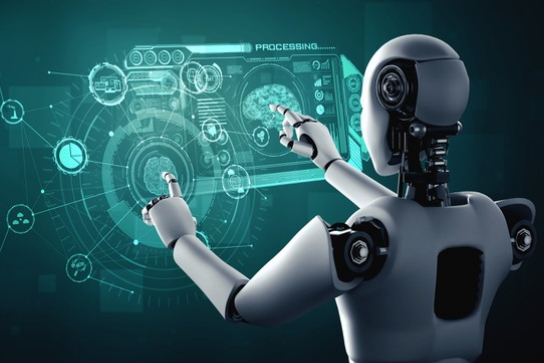
Smart Assistants: AI-powered assistants will become more prevalent, helping with task management, information retrieval, and decision-making support.
Collaborative Robotics: Also known as cobots, these robots will work alongside humans in manufacturing, healthcare, and service industries, performing tasks that require precision and strength while humans focus on more complex, cognitive tasks.








Personalized and Adaptive Learning
AI Tutors: These systems will provide personalized education experiences, adapting to individual learning styles and paces, offering tailored feedback, and recommending resources based on performance.
Lifelong Learning: AI will facilitate continuous skill development and learning, helping individuals keep up with the fast-paced changes in the job market.
Healthcare Advancements
Personalized Medicine: AI will analyze genetic information, lifestyle data, and medical history to create personalized treatment plans, improving patient outcomes.
Predictive Analytics: AI systems will predict disease outbreaks and patient health trends, allowing for proactive healthcare measures and resource allocation.
Creative Collaboration
Co-Creative AI: Artists, writers, and musicians will increasingly collaborate with AI to generate novel ideas, explore new styles, and create innovative works. AI can assist in drafting, composing, and visualizing creative projects.
Content Generation: AI will help generate content for marketing, entertainment, and education, creating immersive and personalized experiences.
Enhanced Decision-Making
Data-Driven Insights: AI will provide deeper insights and predictions from big data, assisting leaders in making informed strategic decisions.
Risk Management: AI will improve risk assessment and management in various fields, including finance, insurance, and environmental conservation.
Human-Centric AI Design
Explainability and Trust: Developing AI systems that are transparent and explainable will build trust and ensure users understand AI’s decision-making processes.
Ethical AI: Ensuring AI systems are designed with fairness, accountability, and privacy in mind will be crucial. Ethical guidelines and regulatory frameworks will guide the development and deployment of AI.
Enhanced Communication and Collaboration Tools
Language Translation: Real-time language translation powered by AI will break down communication barriers, fostering global collaboration.
Virtual Collaboration: AI will enhance virtual meetings and remote work by providing intelligent scheduling, summarizing discussions, and facilitating collaboration across different time zones and languages.
Improved User Interfaces
Natural Interaction: Advances in natural language processing and computer vision will enable more intuitive interactions with AI systems through voice, gestures, and facial expressions.
Augmented Reality (AR): AI-powered AR tools will overlay information and guidance in real-world environments, aiding in tasks like assembly, repair, and education.
Potential Challenges
Ethical and Privacy Concerns: Balancing the benefits of AI with privacy rights and ensuring ethical use of AI technologies.
Job Displacement: Addressing the impact of automation on jobs and ensuring reskilling and upskilling opportunities for the workforce.
Bias and Fairness: Ensuring AI systems are free from bias and provide fair outcomes for all users.
Conclusion
The future of human-AI collaboration holds great potential to enhance productivity, creativity, and quality of life. By addressing the associated challenges and focusing on ethical and human-centric design, we can ensure that AI technologies are developed and deployed in ways that benefit society as a whole.

Leave a Reply